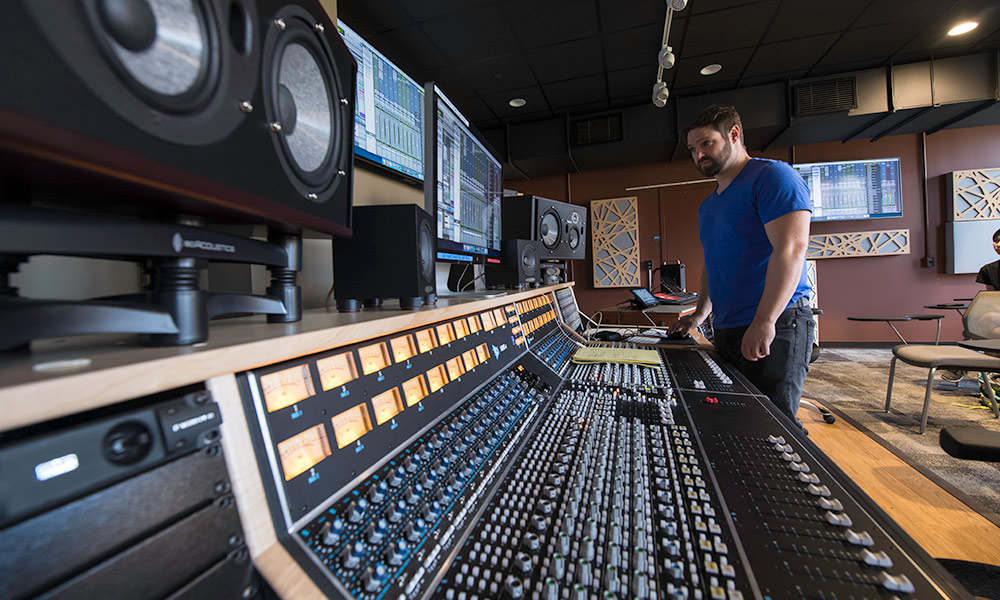It is 10 a.m. on a Sunday morning and every seat is occupied in the control room of the new recording studio in Gavett Hall.
More than 30 audio and music engineering students at the University of Rochester have turned out for a master class by four-time Grammy Award winner Leslie Ann Jones, who 40 years ago began pioneering a place for women as audio engineers and producers in the recording industry.
Jones, the director of music recording and scoring at Skywalker Sound, is impressed that nearly half the students are women.
“Look at the number of women in this room,” she says. “That’s really astounding to me.”
Indeed, at the start of her career, Leslie Ann Jones was the only woman in a control room.
‘Power in making things sound better’
Jones is the daughter of Spike Jones, the musical satirist whose band became famous in the 1940s and ’50s for its comedic renditions of popular songs and classical music, including gunshots, cowbells and outlandish vocals. Her mother is Helen Grayco, who was a singer in the band.
Leslie Jones also aspired to be a musician. Starting at age 14, she played electric guitar and sang backup vocals in bands with her brother and cousins during the 1960s in Los Angeles. They were good enough to be signed by various labels, but none of their songs were ever released.
“I needed to figure out a way to make a living,” Jones explained during a lecture sponsored by the Audio Engineering Society student chapter. She decided to concentrate on “doing the sound” for other bands. “There was something about having a console, putting my hands on faders, and being able to rebalance background vocals and make things sound different. There was a lot of power in this.”
However, in the early 1970s, at least in the major recording studies, that power was wielded exclusively by men. “At that time there were no women engineers at any of the major label studios that I know of,” Jones says. “Most women were doing classical music and were considered balance engineers. They weren’t producing projects, and I don’t think they were editing.”
Jones was not deterred. She read Stereo Review and other hi-fi magazines to learn about signal-to-noise, bandwidth frequency response, and equipment specs. She took a recording class at an experimental college.

The art and science of sound
The University’s $3 million investment in a new state-of-the-art recording studio, control room, mixing rooms, and sound design lab is a major milestone for Rochester’s now six-year-old audio and music engineering program.
‘We’ll see how the guys feel’
Her first engineering job was as a production engineer at ABC Studios, making copies of recordings. When she asked Phil Kaye, president of ABC Recording Studios, for a recording job, Kaye agreed. However, he added, “we’ll see how the guys feel about having a woman in the control room.”
“People hear that now and react, ‘what a horrible thing for him to say.’ But I didn’t take offense at it,” Jones says. “That was just the way it was.”
She found that “the best thing I could do was not pretend that I could do everything,” Jones says. “I learned very early on to rely on mentors, people who were vested in my success just by virtue of my asking questions of them.”
She also discovered that the “low expectations people had of my capabilities”—because of her gender—actually worked to her advantage. It was that much easier to exceed expectations. “They didn’t expect much, so when I delivered, I could do no wrong,” Jones says.
“I’ll never know how many jobs I didn’t get because of my gender, but I’m a very ‘glass half full’ person, so I always think about the work I did get.”
Her first credit as an engineer was for John Mayall’s Hard Core Package in 1977. Since then—at ABC, Automatt, Capitol, as an independent engineer and now Skywalker Sound—she has worked with a broad range of artists, including Herbie Hancock, Rosemary Clooney, and Carlos Santana. She helped with the score for Francis Ford Coppola’s Apocalypse Now. She is a past chair of the National Academy of Recording Arts and Sciences Board of Trustees, the organization that awards Grammys, and in 2018 was inducted into the TEC Awards Hall of Fame.
Even now, Jones says, women still face challenges in the industry. “And the only way you can overcome that is by taking the opportunities as they come, by raising your hand and saying yes to anything—even if you don’t feel completely comfortable. Part of learning is failing and trying to figure out what it is you don’t know.”
‘She’s inspiring a whole generation’
Jones offered plenty of other advice for students. For example:
- Talk to clients well in advance of a recording session about the kind of sound they want.
- Sketch out in detail a floor plan for the placement of every mike and instrument in the studio. “We do this every session”—spending a day or two if necessary, Jones says. “The last thing you want is to wander to around during a session trying to figure out why something’s not working.”
- Be methodical in labeling every mike, every channel, every track, and storing it in a folder for later reference.
- Listen to all kinds of music, even the music you don’t necessarily enjoy. “It’s amazing, the sounds you can discover,” Jones says.
- Avoid the overuse of compression, a technique for leveling out the peaks and valleys in a soundtrack by turning down the volume peaks while increasing the quietest parts.
She had an opportunity to reinforce that last point during the master class, as four students took turns at the console, calling up their recording projects for Jones to comment on.
One of the mixes was a nicely rendered jazz piece written by another student featuring piano, saxophone, electric guitar, electric bass and drum kit. However, it had “so much compression everywhere that nothing breathes,” Jones said. “Even when you get to the loudest part of the sax solo, I don’t feel that ‘ah-ha’ moment of someone having achieved greatness over the last 24 bars.”
“I always have to get back to the composition,” she tells the students. “I always consider that my job as an engineer and mixer is to really serve what somebody wrote. And (in this case) I would feel that’s not what the composer intended.”
Alexa Silverman ’21, a business major who is earning a minor in audio and music engineering, says it was “such an amazing opportunity to have someone of her caliber come to the University, not only to give a lecture about her life experiences, but to really engage with what the students themselves are working on.
“Especially as a female engineer of her caliber, she’s inspiring a whole generation of audio and music engineering students to pursue their careers and not be deterred by the glass ceiling that she definitely broke for us.”
Silverman says wants to work in the music industry, “whether it’s through publishing, or marketing for record labels. I just want to make a difference.”
She couldn’t find a better role model than Leslie Ann Jones.



